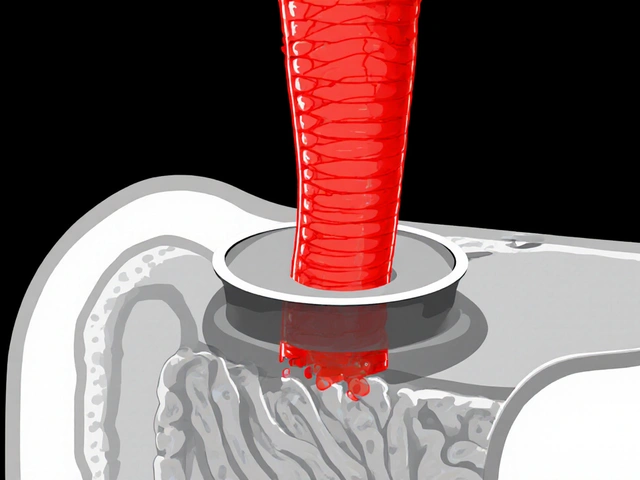
Ever spent a beautiful spring afternoon sneezing your head off, desperate for relief? You’re definitely not alone—especially if your nose starts running before you’ve even finished breakfast. The world is teeming with allergens, and for some people, allergy season feels relentless. Then there’s Clarinex, a prescription antihistamine that quietly helps millions of people enjoy their days without watery eyes and endless sneezing. But is this blue pill really the hero it seems? If you’re wondering why your doctor reached for Clarinex instead of something over-the-counter, or you just want the real scoop on how it works, buckle up.
What Is Clarinex and How Does It Work?
Clarinex, also called desloratadine, isn’t your granddad’s old-school drowsy allergy pill. First approved by the FDA in 2001, Clarinex belongs to the second generation of antihistamines, a class known for being way less likely to knock you out during a meeting or make you feel groggy on a busy day. It’s basically an amped-up cousin of loratadine (think Claritin), tweaked to last longer and work with fewer side effects.
Antihistamines block histamine, a substance in your body that fires up when you encounter pollen, dust mites, pet dander, or other allergens. When histamine shows up, it causes blood vessels to expand and your nose to start dripping. Clarinex swoops in, blocks histamine’s efforts, and calms your system so the sneezing, itching, and sniffles start melting away. What’s interesting is that Clarinex targets only certain histamine receptors (H1), which is why it causes less drowsiness compared to first-generation antihistamines like Benadryl.
Doctors usually prescribe Clarinex for seasonal allergic rhinitis (those spring and fall allergies), perennial allergic rhinitis (year-round indoor/outdoor allergies), and sometimes for chronic idiopathic urticaria—a fancy way to say unpredictable hives without an obvious cause. It comes in several forms: tablets for adults, rapidly disintegrating tablets, and an oral syrup for kids who can’t swallow pills yet.
What sets Clarinex apart, besides its low potential for sleepiness, is its 24-hour coverage. That means just one dose a day can be enough to handle your symptoms. Its absorption is unaffected by food, so you can take it with breakfast, at lunch, or even right before bed if you like to keep things simple. And here’s a cool detail—desloratadine, the active ingredient, is actually the main active metabolite of loratadine, meaning your body converts Claritin into this compound anyway. But taking Clarinex skips the conversion step and brings faster relief.
Clarinex Uses and Who Should Consider It?
If you’re picturing an allergy medicine only for hardcore sufferers, think again. Clarinex is prescribed for anyone—from little kids as young as six months (in syrup form) to adults dealing with a never-ending onslaught of sniffles and itching. Whether it’s a classic case of spring allergies, dust mites year-round, or red eyes triggered by the neighbor’s new kitten, Clarinex covers the bases.
It’s especially popular among people who’ve tried over-the-counter meds like Zyrtec (cetirizine), Allegra (fexofenadine), or Claritin (loratadine) and still can’t find relief—or can’t stand the side effects. Because it’s less likely to cause drowsiness, it can be good for folks who drive a lot, go to school, or need to keep sharp for work. It’s also a solid choice if you deal with hives that seem to come out of nowhere.
Interestingly, studies have found that Clarinex begins kicking in as little as 30 minutes after taking it. In one double-blind, placebo-controlled study of over 900 participants, desloratadine reduced total symptom scores for allergic rhinitis by about 40% within hours, while most people reported no more sleepiness than if they’d taken a sugar pill. Another upside—because it’s not sedating, you don’t have to worry about it piling up in your system and causing grogginess, even after days of use.
Of course, it’s not for everyone. Clarinex isn’t recommended if you’re severely allergic to desloratadine or any of its ingredients. Plus, certain medical conditions—like severe liver or kidney problems—mean your doctor might suggest a lower dose or try a different medication altogether. Pregnant or breastfeeding women should check in with a doctor first, since the safety data, while reassuring, is still limited. The prescription-only status of Clarinex means that if you’re getting it, your doctor thinks your allergies are tough enough that stronger, safer daily coverage is worth it.

Benefits, Fast Facts, and How It Compares
When you measure it up against other allergy medications, Clarinex has some pretty attractive features. For one, it’s non-drowsy for most people—less than 2% of users report any sleepiness, and that’s pretty remarkable compared to the roughly 12% you get from medicines like cetirizine. If you’ve ever zoned out during an afternoon meeting and blamed your allergy meds, this matters. The low risk of drug interactions is another highlight; it usually won’t cramp your style if you’re taking birth control, antidepressants, blood pressure meds, or heart pills. That’s a huge relief if you juggle prescriptions.
Plus, it doesn’t have any known major interactions with food, alcohol, or citrus juice—though it’s always smart to double-check with your doc about the specifics if you’re on multiple meds. The quick onset (often within an hour) and once-daily dosing mean you don’t have to carry pills everywhere or set a midday alarm on your phone. And because it comes in a melt-in-your-mouth version, kids or people with swallowing issues can still get relief.
Here’s a quick rundown comparing leading allergy meds, based on common criteria:
| Medication | Generic Name | Drowsiness? | Dosage | Prescription Needed? |
|---|---|---|---|---|
| Clarinex | Desloratadine | Rarely | 1x per day | Yes |
| Claritin | Loratadine | Rarely | 1x per day | No |
| Zyrtec | Cetirizine | Possible | 1x per day | No |
| Allegra | Fexofenadine | Rarely | 1x per day | No |
Clarinex is especially helpful for what doctors call nasal and non-nasal symptoms. So it tackles stuffy or runny noses and also soothes itchy eyes, hives, and tickly throats. In clinical trials, people with seasonal allergies using Clarinex experienced significant symptom reduction over four weeks, and many started noticing improvements in just a few days. That’s the kind of thing you appreciate if you’re tired of starting every morning with a tissue box.
Potential Side Effects, Warnings, and What to Watch For
While Clarinex gets high marks for being gentle, nothing’s perfect. Side effects do happen, though they’re usually mild and go away on their own. The most common are sore throat, dry mouth, muscle aches, headaches, and a little bit of sleepiness. Less than 2% of people experience any drowsiness at all. Occasionally, people report nausea, rapid heartbeat, or digestive issues. The oral solution might cause some stomach upset for kids, but that’s pretty rare.
Here’s the thing: if you notice a sudden rash, trouble breathing, or swelling of your face or throat, drop everything and get medical help—these could be signs of a serious allergy. And if you start noticing yellowing of your skin, unexplained bruises, or any sharp decrease in urination, it could be a sign that your liver or kidneys aren’t processing the med properly. That warrants a call to your doctor.
People with very severe kidney or liver disease should let their prescribers know ahead of time. Your doctor may lower your dose or pick something that doesn’t get processed through your liver or kidneys as much. If you’re a parent giving Clarinex to a child, keep an eye out for any unusual tiredness or stomach discomfort—kids’ bodies process meds differently, and sometimes they can react in odd ways.
It’s also worth noting: if you use allergy shots or immunotherapy, you can still take Clarinex, but let your allergy doctor know about all your meds. Rarely, combining multiple antihistamines can cause sedation or other odd effects, so mix with caution and under medical advice. And, while Clarinex is less likely to interact with alcohol, combining any antihistamine with booze isn’t a great idea if you want to stay sharp.
Here’s a handy tip: if you’re an athlete, Clarinex isn’t banned by most sports organizations, so no worries about getting flagged on a drug test. But always double check if you’re competing at a super high level.

Tips for Getting the Most Out of Your Clarinex Prescription
If you’re new to Clarinex, you’ll probably want to know how to make the most of it. Here are some tried-and-true tips straight from allergy specialists (and folks who’ve lived through brutal pollen seasons):
- Take it at the same time daily—this keeps levels steady in your system and gives you 24-hour coverage.
- No need to take with food, but if the pill upsets your stomach, a light snack can help.
- If you miss a dose, just take it as soon as you remember. If it’s nearly the next dose, skip it—don’t double up.
- Store your meds out of direct sunlight and heat. High temps can degrade the active ingredient.
- Track your symptoms in a notebook or allergy app so you and your doctor can see trends and adjust treatment if needed.
- If you feel drowsy—even on a non-drowsy med—give it a few days. Your body may adjust. If not, ask about switching times or even medications.
- If allergy symptoms are still bugging you after a few weeks of regular use, don’t just crank up your dose. Check back with your doctor—there could be an underlying trigger or a better med combo for you.
- Lotions, saline nasal sprays, or cool compresses can help control itchy skin and nose symptoms, giving your Clarinex time to take full effect.
- Keep an eye out for special programs or coupons from the manufacturer—prescription allergies can get expensive fast.
Clarinex might just be the unsung hero in the battle against relentless, stubborn allergies. From its gentle side effect profile and quick action to the ease of once-a-day dosing, it’s easy to see why doctors keep it in their arsenal. Of course, it’s always best to tailor your allergy plan to your own routine, triggers, and health profile—don’t be afraid to quiz your doctor about your specific needs. With the right information and support, you can leave the days of sneezing through breakfast behind.





Comments (12)
Ada Lusardi
Omg, I’ve been using Clarinex for my crazy allergies, and it’s been a total lifesaver! 🌸🤧 Like seriously, those sneezes and itchy eyes were driving me insane! The post covers all the bases, but I just wanna say, no drug is perfect, you know? You gotta watch out for stuff like drowsiness or headaches, which I got sometimes.
Also, be careful mixing it with other meds. Last thing you want is an extra surprise side effect! But hey, overall, the relief is quick and worth it. Anyone else here had crazy reactions or just smooth sailing with Clarinex? I’m curious! 😊
Calvin Smith
Well, can't say I’m shocked by these allergy meds doing their job. Clarinex is just your typical second-gen antihistamine, nothing revolutionary. It's like the pharmaceutical industry's little puppet dance to keep us sniffle-free while we sacrifice a bit of our brainpower to drowsiness. Honestly, if it’s not knocking you out or making you feel like a zombie, it’s not doing enough, right?
But hey, kudos to the article for spellin’ it out so clearly. These meds aren’t magic potions, but they get the job done. Anyone here actually tried it and can confirm it kills allergies without turning you into a couch potato?
Jessica Martins
I appreciate the thoroughness of the post regarding Clarinex. It’s very clear about potential side effects and usage tips, which is crucial because not everyone reads the leaflet carefully. The factual presentation helps users make informed decisions.
Personally, I’ve found that keeping track of the timing and dosage has helped me avoid some mild side effects. Have any of you experienced difficulties managing those factors? I’d like to hear your strategies for safely taking allergy meds.
Lara A.
Seriously people, are you blind to the risks? This so-called quick relief is just a sneaky trap from Big Pharma!!! They want you dependent and foggy-headed to keep the cash flowing. Look at the side effects carefully!!! Drowsiness?!?! That’s just what they want – to numb your mind so you don’t question their motives!!!
I refuse to trust any meds blindly. We are being puppets, and Clarinex is just another piece of the puzzle. Wake up, people!!!
Ram Dwivedi
Hey folks, I just want to add that while Clarinex is effective, it's always best to consult a healthcare provider since allergy causes differ. Sometimes lifestyle and environmental adjustments can work better or in combination.
Also, watching for drug interactions is highly important, especially if you're on other medications. This post is a great starting point, but professional guidance always tops any online info. 😊
Alan Whittaker
Honestly, relying on pharmaceuticals like Clarinex for symptom relief just ignores the bigger picture! They pimp the drug, telling you all the fine print, but who tells you about the long-term health consequences? There’s always a catch with such medicines.
Read deeply the side effects and question why these exist at all. Are allergies a symptom we should be covering up or the system screaming at us to fix the environment, diet, or lifestyle? This post is fine but stops short of this reality.
Gayatri Potdar
Yea totally get that paranoia! These meds feel like a trap sometimes, like they sell relief but the side effects can mess you up so bad you don’t even realize. I always cross-check everything and avoid taking any new pill without full research. Is anyone else skeptical about even the pharmaceutical companies who promote Clarinex?
Ram Dwivedi
@73 I get where you’re coming from, but paranoia can blind us from beneficial science too. While skepticism is healthy, modern allergy meds like Clarinex have a strong safety profile when used correctly. Of course, nothing is perfect, but let’s balance caution with reason.
Personally, I encourage following doctor’s guidelines and keeping open communication for any adverse effects. What do you think about combining natural remedies with meds for better control?
pooja shukla
Honestly, these allergy meds are a must-have especially when air pollution is skyrocketing. No point in conspiracy theories when you can’t breathe properly, right? Clarinex provides relief, and that’s what matters. People should focus on protecting themselves first instead of doubting everything.
Poonam Mali
Okay, but let's cut through the jargon here — if you’re on Clarinex and not experiencing the confusing dizziness or brain-fog, are you even taking it right? The pharmacokinetics of this drug dictate those side effects, and if you’re dodging them, maybe your dosage or metabolism is out of whack. Anyone else noticing this weird discrepancy?
Jessica Martins
Interesting point made about dosage and metabolism. Indeed, individual differences play a big role in side effects. This article could have further emphasized personalization in allergy medication use. Has anyone had experiences with dose adjustments for Clarinex that helped reduce side effects while maintaining effectiveness?
Ada Lusardi
Oh wow, so many passionate takes here! 😊 I just want to say from my personal experience: yes, dose tweaking under doctor’s supervision helped me lessen headaches and keep the relief on point. The key is communication with your doc, not jumping off meds or blindly trusting hype on either side.
Also, a bit of humor helps me, because facing allergies is already rough enough without turning it into a drama fest. Sending good vibes and clear sinuses to everyone! 🌷🌞